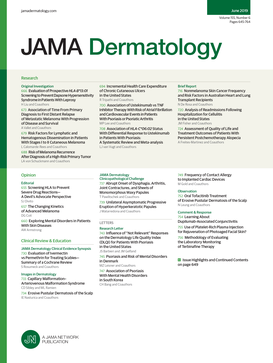Key Points
Question Is there an association between human leukocyte antigen (HLA) and sulfamethoxazole (SMX)/cotrimoxazole (CTX)–induced severe cutaneous adverse reactions (SCARs)?
Findings In this systematic review and meta-analysis of 6 studies involving 322 patients with SCARs, significant associations were identified between the HLA-A*11:01, HLA-B*13:01, HLA-B*15:02, HLA-B*38:02, and HLA-C*08:01 genotypes and SMX/CTX-induced SCARs. The HLA-B*15:02 and HLA-B*38:02 genotypes were significantly associated with SMX/CTX-induced Stevens-Johnson syndrome/toxic epidermal necrolysis (SJS/TEN), while the HLA-A*68:01 and HLA-B*39:01 genotypes were associated with SMX/CTX-induced drug reaction with eosinophilia and systemic symptoms; the HLA-B*13:01 allele showed an association with SMX/CTX-induced SJS/TEN and drug reaction with eosinophilia and systemic symptoms.
Meaning The results of this review suggest that multiple HLA alleles were associated with SMX/CTX-induced SCARs.
Abstract
Importance Sulfamethoxazole (SMX) and cotrimoxazole (CTX), a fixed-dose combination of SMX and trimethoprim in a 5:1 ratio, are antibacterial sulfonamides commonly used for treating various diseases.
A substantial prevalence of severe cutaneous adverse reactions (SCARs) following the administration of these drugs has been reported. However, the association between human leukocyte antigen (HLA) genotypes and SMX/CTX-induced SCARs has remained unclear.Objective To investigate the association between HLA genotypes and SMX/CTX-induced SCARs.
Data sources A comprehensive search was conducted in CENTRAL (Cochrane Library), MEDLINE, and Embase from inception to January 17, 2023.
Study Selection Case-control studies that recruited patients who had experienced SCARs following SMX or CTX were included, and HLA alleles were analyzed.
Data Extraction and Synthesis Two independent authors extracted data on study characteristics and outcome data. The Meta-analysis of Observational Studies in Epidemiology (MOOSE) reporting guideline and the Preferred Reporting Items for Systematic Reviews and Meta-analyses (PRISMA) reporting guidelines were followed. The Newcastle-Ottawa Scale for case-control studies was used to assess study quality. Odds ratios (ORs) were calculated using a random-effects model for meta-analysis.
Main Outcomes and Measures The prespecified outcome was the OR comparing SMX/CTX-induced SCARs with healthy or SMX/CTX-tolerant controls based on different HLA alleles.
 |
| Prevalence of Severe Cutaneous Adverse Reactions (SCARs) in Individuals Carrying Different Human Leukocyte Antigen (HLA) Alleles Compared With Tolerant Controls |
Conclusions and Relevance The results of this systematic review and meta-analysis suggest that multiple HLA alleles (HLA-A*11:01, HLA-B*13:01, HLA-B*15:02, HLA-B*38:02, and HLA-C*0801) are associated with SMX/CTX-induced SCARs.

No comments:
Post a Comment